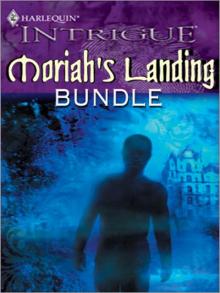- Home
- Amanda Stevens
The Whispering Room Page 4
The Whispering Room Read online
Page 4
But she could feel his eyes on her.
“Your daughter’s told me a lot about you,” he said with a liquid smoothness. “I’ve sure been looking forward to coming to see you. If you don’t mind my saying so, this is a pretty special day for me.”
“Ellis,” said the angel. “Would you leave us alone for a moment?”
“Oh, you bet. Take all the time you need. I’ll just wait outside.”
He bent suddenly and put his face very close to Mary Alice’s so that she could no longer avoid his gaze.
And this time, he grabbed her hand before she could pull it away. He held it very tight between both of his. His skin was cold and dry, and there was something reptilian about those terrible, gleaming eyes.
“I expect we’ll meet again very soon, Mary Alice. And I do so look forward to that encounter.”
He released her hand then and straightened, and though Mary Alice still kept her gaze averted, she sensed something pass between the man and her daughter. A smile maybe. Or a brief, intimate touch.
A smaller, softer hand took hers once they were alone. “Everything’s going to be all right now. You’ll see.”
Mary Alice placed the angel’s hand between both of hers and clung for dear life.
“It’s okay, Mama. I know what I have to do. I’ve always known.”
That soft hand came up to stroke Mary Alice’s cheek.
“You taught me well. And now that I have Ellis helping me, it’s going to be so much easier.” The angel’s blue eyes shimmered with excitement as she leaned forward and lowered her voice to a whisper. “Mama…he’s one of us!”
No, Mary Alice thought in despair. That man is not one of us.
Ellis Cooper was one of them.
Ellis leaned a shoulder against the wall as he peered through the reinforced glass panel in the door, watching in fascination as the little drama unfolded inside.
Every so often, he would glance up the hallway in front of him and then over his shoulder behind him to make sure one of the patients or someone on the staff didn’t sneak up and catch him unawares.
He was probably being a little paranoid, Ellis realized, but he knew only too well of the trickery and deception that went on in a place like this. You couldn’t trust anyone.
Ellis had spent a couple of hitches in state mental wards, the first when he was only fifteen years old. Given his experience, he couldn’t say he was exactly happy to be back in one. But at least today, he had the freedom to walk out whenever he chose. That was something.
Normally, he steered clear of any type of institution, be it a government office or even a regular hospital. He had a fundamental distrust of anything that smacked of authority, of any place in which he was not in complete control, but he’d found the prospect of a meeting with the infamous Mary Alice Lemay too irresistible to pass up.
So he’d temporarily disabled his aversion, if not his paranoia. Ellis knew from past experience that he could stand anything for a little while, even the worst kind of torture.
Now that he was here, though, all those old feelings were creeping up on him again. And dear God, the memories!
The slack jaws and vacant stares.
The unholy smells that drifted from the open doorways.
He glanced up at the surveillance camera at the end of the hallway. There was another one at the opposite end and probably a few hidden in places that were not readily discernable.
Oh, yes, Ellis knew all about those cameras.
The incessant winking of the red eyes had reminded him night and day that he was never alone. Not in his room, not in the cafeteria, not in the showers or on the toilet. As long as those red eyes were blinking, someone was watching. Always.
Even when he prayed.
Maybe especially when he prayed, seeing as how it had been his religion that had netted him his first trip to the psych ward in the first place.
Well, not his religion exactly. Not back then. That was before his awakening.
It was his father’s interpretation of the gospel that had caught the attention of Child Protective Services in the backwoods Georgia town where he grew up.
His father, Nevil, had been a preacher and an avid follower of the teachings of George Went Hensley, one of the founders of the charismatic movement. Ellis’s father, like Hensley, had believed in a strict interpretation of the Bible, including the “signs” passage from Mark:
And these signs will accompany those who believe; in my name they will cast out demons;
they will speak in new tongues; they will pick up serpents with their hands; and if they drink any deadly poison, it will not hurt them; they will lay their hands on the sick, and they will recover.
As a boy, Ellis had been enthralled by the serpent-handling spectacle that accompanied some of his father’s sermons. Ellis hadn’t been a true believer back then, but he’d loved watching the snakes. To him, they were among God’s most glorious creatures. Even the thick, leathery water moccasins, with their white mouths and razorlike fangs, held a certain fascination.
Along with the rattlers and copperheads, the moccasins had been kept in cages behind the chicken coop at Ellis’s home. Once his after-school chores were done, he would head out there and sit in the grass for hours, mesmerized by the sinewy movement of the reptiles as they climbed up the mesh wire of the cages and wrapped themselves around one another.
By this time, Ellis was quite adept at catching the creatures in their natural habitats—underneath rocks and rotting logs and in muddy sloughs—but once they were placed in the cages, he wasn’t allowed to handle them. That privilege was reserved for his father and some of the elders of the church.
It was a common misconception that serpent-handlers believed the Holy Spirit would keep them safe. Every last one of them knew the dangers of what they did. Many had lost fingers and limbs as a result of the infection brought on by a bite. One or two had even lost their lives.
It wasn’t a matter of faith, Ellis’s father had once explained. It was about obeying the word of God.
Ellis’s first snakebite had come just after his fifteenth birthday.
He’d found a copperhead sunning on the bank of the creek that ran behind their house. Holding the head so that the snake couldn’t strike, he’d lifted the reptile close to his face, admiring the flicker of the serpent’s tongue, the dark gleam in the slitted, catlike eyes.
Ellis had become so engrossed in watching the play of sunlight on the glistening scales that he hadn’t realized the snake’s head had slipped free of his grasp.
The fangs caught him in the side of his neck, and the copperhead hung there for a moment as Ellis’s skin started to burn like wildfire.
Afterward, he hurried home, washed the bite with soap and water and kept his mouth shut. He didn’t tell anyone about his carelessness or that he’d flown into a rage and killed the poor snake before it could slither away.
A few hours later, he began to feel achy and weak, like he was coming down with the flu. The bite area was swollen and tender, but he told himself he’d be fine. Copperhead venom wasn’t nearly as dangerous as the poison from the other pit vipers. Sometimes the bites had no effect at all.
But within days, gangrene set in. His skin around the afflicted area turned black and felt cold to the touch.
Still, he tried to keep the wound hidden by wearing his collars buttoned, but his science teacher noticed the swelling and discoloration one day and sent him to the school nurse. She took one look and rushed him to the hospital.
What followed was a nightmare scenario of painful surgeries and skin grafts where the dead flesh had to be cut away from the bone.
Convinced he had been bitten as the result of his father’s dangerous religious practices, CPS removed Ellis from his home, but rather than placing him in foster care, they sent him to the state hospital for psychiatric evaluation.
It was there, in that place of misery and confusion, that he had finally experienced his religious awakening.
A nurse passing him in the corridor gave him a curious glance. Ellis turned slightly so that she could see the “bad” side of his face. When she caught a glimpse of the scar tissue, she quickly looked away. Then her gaze came back to him, and she smiled in the tentative, flustered way that Ellis was used to.
He turned and watched as she hurried down the hallway, and when she glanced over her shoulder, the smile he flashed seemed to momentarily stun her.
Ellis gave a low chuckle. That was the cool thing about his appearance. His scarred, pale countenance seemed to attract even as it repelled.
Today he had on a black suit that was perfectly tailored to his thin frame. He cut a striking figure and he knew it. He was only thirty-seven, but he’d started to go gray during his incarceration in the mental hospital. By the time he was released, his hair had been as white as snow, which he took as an outward sign of his spiritual metamorphosis.
He’d worn his hair natural for a long time, but these days, he’d taken to dyeing it black, and he liked to slick back the glossy strands from his high forehead in the manner of an old-timey preacher.
But his hair and even the scar played second fiddle to his eyes. They were by far his most prominent feature. So dark a brown they were almost black, but in the center radiated the heat and fury of a fire-and-brimstone zealot.
Ellis didn’t think of himself that way, though. He considered himself a soldier and sometimes a prophet.
Turning his attention back to the glass panel, he lifted the origami crane he’d found in Mary Alice’s room and watched her over the graceful curve of the paper head.
She stared back without blinking. Her eyes were clear and blue and mesmerizing in their intensity.
And Ellis thought, almost in awe, She knows.
It was almost as if Mary Alice Lemay could peer straight down into his soul.
Five
The day was still, hot and hazy as Evangeline and Mitchell drove into the Garden District.
The streets in this glorious old neighborhood were lined with the gnarled branches of live oaks, and the lush, vivid yards—heavily painted with crepe myrtle, oleander and flaming hibiscus—provided a striking contrast to the gleaming white houses.
Underneath second-story verandas, ceiling fans rotated in the sluggish heat. Children played in the lawn sprinklers while gardeners dripping with sweat clipped hedges and weeded flower beds thick with petunias and geraniums.
This was a neighborhood steeped in history and quiet refinement; a lifestyle of summer garden parties, servants and drinks by the pool.
A world very different from the one Evangeline knew.
After leaving the crime scene earlier, she’d showered and changed her clothes, but the scent of Paul Courtland’s rotting flesh still clogged her nostrils as she pulled the car to the curb in front of his house.
She leaned her arms against the steering wheel and stared out the window at the house, dreading the moment when she would have to climb out of the car, walk up to the house and ring the bell.
Mrs. Courtland? I’m afraid I have some bad news for you.
Evie? I hate like hell to be the one to have to tell you this.
“Evie?”
For a moment, Mitchell’s voice seemed so much a part of her memory, Evangeline forgot he was in the car with her. She turned and glanced at him. “Yeah?”
“You ready to do this?”
“Can I just go have a root canal instead? Or maybe get some surgery done without anesthesia?”
“’Fraid not. Comes with the territory. Could be worse, though,” he added, and Evangeline knew that he was thinking about the night Johnny died, too.
Silently, they got out of the car and started up the walkway together.
The Courtland home was a three-story Greek revival with wide Doric columns in the front and a walled garden in the back. Baskets of trailing ferns hung from the balconies, and the carefully tended flower beds exploded with color.
The sound of splashing water and laughter drifted over the garden walls, and as Evangeline walked up the front steps, she heard a child singing in the back, a happy, inane tune that tugged at her heart and made her wish she was anywhere in the world but where she was—standing at a dead man’s front door.
A middle-aged woman with short gray hair answered the door straightaway. She wore brown slacks and a blue, nondescript top that she tugged down over her rounded hips. “Yes?”
“We’re NOPD,” Mitchell said as he hauled out his wallet and showed her his ID. “Are you Mrs. Courtland? Mrs. Paul Courtland?”
“No, I’m the Courtlands’ nanny.” Her hazel eyes flickered with uncertainty. “Is there some trouble, Officer?”
“It’s Detective. And, yes, I’m afraid there’s been some trouble. Is Mrs. Courtland home?”
“She’s out by the pool with her daughter. Hold on a second and I’ll get her for you.”
Instead of inviting them in, she closed the door in their faces.
Mitchell gave a nonchalant shrug. “Lots of riffraff in the city these days. Can’t be too careful.”
“You do look a bit dodgy. Where’d you get that shirt?”
“Salvation Army,” he said. “A buck twenty-five.”
They waited in silence until the door was drawn back again a few minutes later. The woman who stood on the other side this time was a thirtysomething blonde wearing a green-and-gold bikini top with a matching sarong fastened at the top of one hip. She was tan and lean with the kind of soft beauty and quiet elegance women of her social station seemed to acquire naturally.
Her full lips glinted with pale peach lip gloss and when she propped a hand on the door, Evangeline saw the same shade of shimmer on her nails. Fine-tuned was the first description that came to mind. Pampered was the second.
“I’m Meredith Courtland,” she said as her cool gaze skipped from Evangeline to Mitchell and then darted past them to the unmarked car at the curb. “How may I help you?”
“I’m Detective Hebert, this is my partner, Detective Theroux.” They both presented their IDs. “Ma’am, I’m afraid we have some bad news for you.”
“Bad news?” She stared at them blankly, as if such a concept were unheard of in her comfortable, insulated world. “Is this about the accident?”
Mitchell glanced at Evangeline. “What accident would that be, ma’am?”
“The fender bender I had in the Quarter yesterday. I left all my information with the other driver, and I’ve already contacted my insurance company. I don’t know why he felt the need to get the police involved.” She looked mildly annoyed as she ran her manicured nails through the precisely clipped strands of her blond bob.
“We’re not here about a car accident,” Evangeline said. “This is regarding your husband.”
“Paul? What about him?” She must have glimpsed something in their faces then because her annoyance vanished, and for a moment, her blue eyes looked as if they were drowning. “Is he…” She drew a quick breath and seemed to dismiss the possibility of any real unpleasantness. “He’s all right, isn’t he?”
“No, ma’am, he’s not.” Evangeline tried to keep her voice neutral, without letting the pity she felt for the woman creep in. “If it’s okay, we’d like to come in and talk to you for a few minutes.”
For the longest time, Meredith Courtland didn’t say a word, just stood there clutching the door while, in spite of her best efforts to cling to denial, her world started to crumble around her.
Evangeline’s heart ached for her. She knew only too well what it was like to be on the other side of that door. To feel so overwhelmed by the news that you forgot how to breathe. You could hear someone talking to you. You could even make out their words. But what they said made no sense. Nothing made sense. How could the husband you’d kissed goodbye that morning, the man you loved more than life itself, be dead?
How, all of a sudden, could the
life you’d shared with him be nothing more than a memory?
Evangeline could feel the burn in her eyes of a thousand unshed tears and she had to glance away for a moment. Sometimes even now a future without Johnny seemed too much to bear.
Meredith Courtland stepped back from the door. “Please come in,” she said shakily.
They stepped into a cool, terrazzo entryway with gilded mirrors and tall vases of pink and white roses. Sunshine spilled in from a domed skylight and dazzled the crystals of a huge chandelier. A floating staircase swept gracefully up to a second-story gallery, where a black maid temporarily appeared at the railing before vanishing back into the shadows.
Meredith Courtland’s gold sandals clicked against the marble floor as she led them down a wide hallway that opened into a large living area decorated with an eclectic mix of modern and antique furnishings.
A wall of French doors opened into the garden, a sun-dappled paradise of banana trees, palms and scarlet bougainvillea cascading over the stucco walls. Just beyond a white gazebo, Evangeline could see the sparkle of turquoise water in a kidney-shaped pool.
Indeed, a world very different from her own.
A little girl in a blue polka-dot swimsuit sat on the floor in front of the windows. She had a feather duster in one hand that she used to tease a tiny black-and-white kitten. When the adults entered the room, the child tossed aside the duster and got to her feet.
“Hello,” she said, with a smile that showcased a perfectly matched set of dimples. She looked to be about four, with gold ringlets and tanned, chubby little legs. “Do you want to see my kitten?” She picked up the tiny cat and clutched it to her chest. “His name is Domino.”
“That’s a good name for a black-and-white kitten,” Evangeline said, captivated by the little girl’s charm.
“Daddy wanted me to name him Bandit, on account of his mask. See?” She held up the kitten so they could admire the black markings on his face. “I like Domino better. Daddy’s just an old silly billy anyway. Right, Mama?”
Meredith Courtland stared at her daughter in stricken silence. When the nanny appeared in the doorway, she said on a quivering breath, “Colette, would you please take Maisie back out to the pool? I’ll join you in a few minutes.”

 Criminal Behavior--A Thrilling FBI Romance
Criminal Behavior--A Thrilling FBI Romance A Desperate Search
A Desperate Search Without A Trace (Echo Lake Book 1)
Without A Trace (Echo Lake Book 1) What She Forgot
What She Forgot Intimate Knowledge
Intimate Knowledge The Prophet
The Prophet Silent Storm
Silent Storm The Visitor
The Visitor The Littlest Witness
The Littlest Witness A Man of Secrets
A Man of Secrets Lover, Stranger
Lover, Stranger Killer Investigation
Killer Investigation Going to Extremes
Going to Extremes The Perfect Kiss
The Perfect Kiss The Restorer tgqs-1
The Restorer tgqs-1 Secrets of His Own
Secrets of His Own The Awakening
The Awakening Moriah's Landing Bundle
Moriah's Landing Bundle Texas Ransom
Texas Ransom The Restorer
The Restorer The Edge of Eternity
The Edge of Eternity Double Life
Double Life Confessions of the Heart
Confessions of the Heart Secret Passage
Secret Passage Kiss and Tell
Kiss and Tell Bishop's Rock
Bishop's Rock The Seventh Night
The Seventh Night Without a Trace
Without a Trace Her Secret Past
Her Secret Past The Innocent
The Innocent The Forgiven
The Forgiven The Bodyguard's Assignment
The Bodyguard's Assignment The Tempted
The Tempted The Whispering Room
The Whispering Room Magnum Force Man
Magnum Force Man The Abandoned
The Abandoned Angels Don't Cry
Angels Don't Cry Matters of Seduction
Matters of Seduction Amanda Stevens Bestseller Collection: Stranger In Paradise/A Baby's Cry
Amanda Stevens Bestseller Collection: Stranger In Paradise/A Baby's Cry The Kingdom
The Kingdom Showdown in West Texas
Showdown in West Texas The Prophet tgqs-3
The Prophet tgqs-3 The Kingdom tgqs-2
The Kingdom tgqs-2 Unauthorised Passion/Intimate Knowledge
Unauthorised Passion/Intimate Knowledge The Prophet (Graveyard Queen)
The Prophet (Graveyard Queen) Dark Obsession
Dark Obsession Secret Sanctuary
Secret Sanctuary Kingsley Baby Trilogy: The Hero's SonThe Brother's WifeThe Long-Lost Heir
Kingsley Baby Trilogy: The Hero's SonThe Brother's WifeThe Long-Lost Heir The Abandoned (the graveyard queen series)
The Abandoned (the graveyard queen series) The Sinner
The Sinner Pine Lake
Pine Lake His Mysterious Ways
His Mysterious Ways